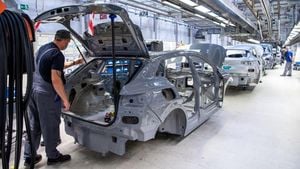Elon Musk has once again found himself entangled in legal ramifications concerning OpenAI, the artificial intelligence company he co-founded. Recently, Musk's attorneys filed for an injunction to prevent OpenAI from fully transitioning to a for-profit enterprise, which he argues contradicts the organization's original mission as a non-profit entity.
The backdrop to this legal clash is Musk's long-standing concerns about OpenAI's shift toward profit-making, especially under the supervision of CEO Sam Altman. Since Musk's departure from the organization in 2018, his frustration seems to have escalated, particularly after OpenAI's recent announcements about its restructuring and pursuit of more significant investments.
OpenAI was inaugurated with the noble vision of advancing artificial intelligence responsibly and ensuring its benefits were accessible to everyone. Initially structured as a non-profit organization, it later adopted the moniker of "capped-profit" – intending to regulate funding efforts and reallocate profits beyond shareholder interests. Musk's latest court plea aims to challenge the legitimacy of this shift.
During a recent court filing, Musk's team urged Judge Yvonne Gonzalez Rogers of the U.S. District Court for the Northern District of California to adjudicate against OpenAI's proposed conversion. He argues not only against the transition but also the alleged competitive restraints put upon the organization's investors, which would place competitors like his AI start-up, xAI, at significant disadvantage.
This conflict traces its roots back to Musk’s exit from OpenAI, which he accused of straying from its initial mission. According to Musk, statements from the company reflect practices he sees as fundamentally contrary to the non-profit principles they began with. After filing suit against OpenAI earlier this year for breaching these principles, he has intensified those claims with this latest injunction.
Musk's discontent is not merely theoretical. He contends OpenAI's current investor agreements have stifled competition within the AI industry, highlighting practices whereby some investors are inhibited from supporting competing initiatives. For Musk, this not only undermines the integrity of the tech sector but directly hampers xAI's aspirations.
OpenAI's representatives have responded, describing Musk's allegations as recycled and baseless. They contested claims about blocking investments, asserting transparency around their restructuring process. Meanwhile, Musk’s team cites backdoor maneuvers with Microsoft as evidence of unfair business practices.
Microsoft, a significant stakeholder of OpenAI, complicates the narrative. Musk feels betrayed by the alliance between OpenAI and Microsoft, particularly as OpenAI's growing influence could grant Microsoft nearly total control over generative AI technologies. He fears this corporate entanglement jeopardizes the foundational ethos of OpenAI.
With OpenAI looming as a dominant player, valued at approximately $150 billion, the stakes rise accordingly. The potential ruling from this case could carry substantial ramifications for both Musk's venture and the regulatory environment surrounding artificial intelligence.
Despite the potential controversy, support for OpenAI’s direction continues, with advocates emphasizing the necessity for well-funded projects addressing urgent issues such as climate change, healthcare, and education. These elements highlight the duality of Musk's concerns; they stem from principled ideals yet brush up against practical necessities for funding major AI advancements.
The current injunction request adds to Musk's fractured relationship with OpenAI and particularly Sam Altman, illustrating deep fissures within Silicon Valley's collaborative spirit. Musk's former camaraderie with the other founders has soured, resulting now in accusations of corruption, mismanagement, and failure to uphold foundational promises.
This case encapsulates the dichotomy within the rapidly-evolving AI market: the pursuit of profit versus the ideal of altruistic innovation. Musk’s intentions may appear noble, but adversaries argue they obscure the practical advancements needed to fuel AI's future growth and humanitarian applications.
Musk's latest maneuvers could tie down OpenAI’s impending moves and potentially create ripples across the broader technology arena as it grapples with the intersection of ethics and profitable engineering. Whether the public will side with Musk and his philosophical argument against corporate profitability—or embrace the reality of OpenAI’s evolution—remains to be seen.



